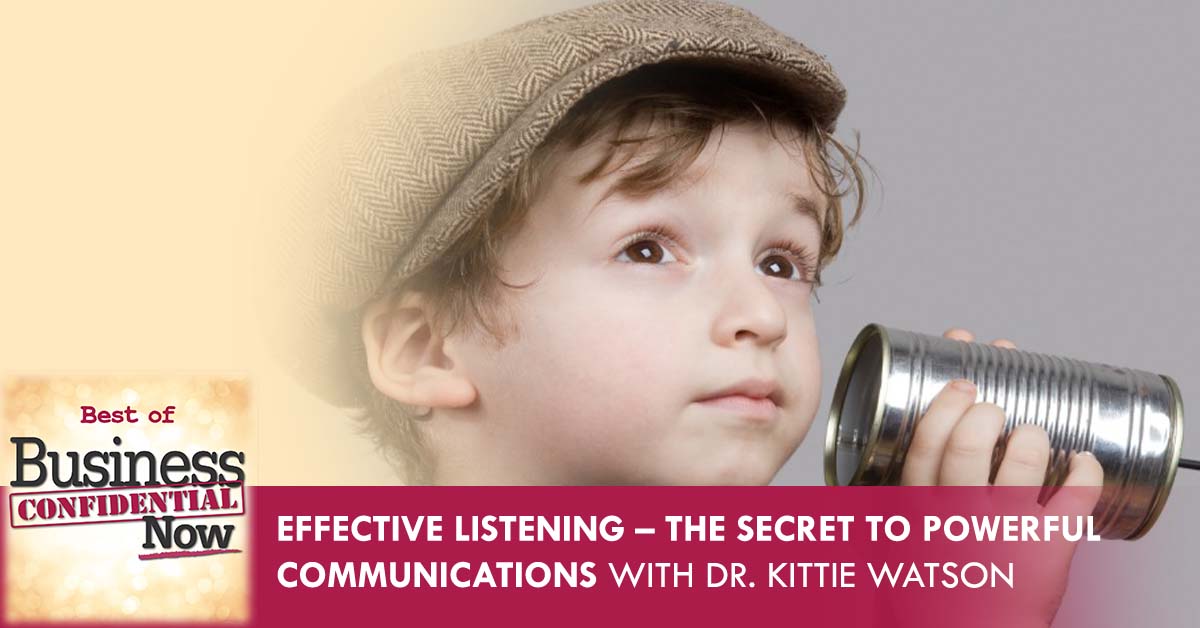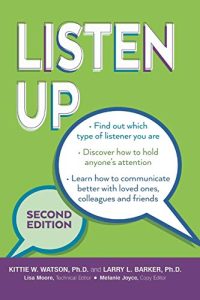
Photo Credits: © istock | standret
Effective listening is challenging. Have you ever been introduced to someone at work only to forget their name 10 seconds later? Join the club.
Also join host Hanna Hasl-Kelchner as she welcomes listening expert and author of LISTEN UP SECOND EDITION Dr. Kittie Watson who says the same thing happens with all kinds of other business information and it’s costing your company more than you know.
—
WHAT YOU’LL DISCOVER ABOUT EFFECTIVE LISTENING:
- How listeners control the conversation.
- 4 types of listener preferences and how they differ.
- The best way to keep someone’s attention.
- How gender impacts effective listening.
- How generational differences impact effective listening.
- 3 ways to compensate for distractions in business meetings.
- The bottom-line impact of ineffective listening.
- An easy way to test your own listening comprehension.
- And MUCH more.
GUEST
 Dr. Kittie Watson is an internationally known listening expert. She’s listed as one of the top twenty-five most prolific women writers on the subject of communications and she’s also the President and founder of Innolect Inc., a global leadership firm.
Dr. Kittie Watson is an internationally known listening expert. She’s listed as one of the top twenty-five most prolific women writers on the subject of communications and she’s also the President and founder of Innolect Inc., a global leadership firm.
Her work focuses on creating more inclusive cultures inside organizations. She has the remarkable ability to size up difficult situations and provide leaders with powerful solutions to build more collaborative teams that are more productive and agile. Her various assessment tools are used around the world to help zero in on where individual or team performance needs a boost and have been used in organizations ranging from the Fortune 500 to educational institutions, government agencies and nonprofits. Her amazing work has been featured in the media, on ABC’s 20/20 and print media such as Money, Enterprising Women, and Chief Learning Officer, among others.
Kittie also is a nationally recognized business leader, having won multiple awards, including being named a 2015 Women’s Business Enterprise Star by the Women’s Business Enterprise National Council (WBENC).
Her book, LISTEN UP SECOND EDITION, has been translated into 8 languages so we can now ‘listen up’ around the world.
—
RELATED RESOURCES:
Contact Kittie at Innolect Inc. and connect with her on LinkedIn. Also connect with Innolect Inc.’s Facebook and LinkedIn pages.
—
SUBSCRIBE, RATE AND REVIEW:
Subscribing is easy and lets you have instant access to the latest tactics, strategies and tips.
Become a Preferred Listener or subscribe to the show through your favorite podcast feed.
Rating and reviewing the show helps us grow our audience and allows us to bring you more of the information you need to succeed from our high-powered guests.
Download ♥ Subscribe ♥ Listen ♥ Learn ♥ Share ♥ Review ♥ Enjoy
—
Effective Listening – The Secret To Powerful Communications With Dr. Kittie Watson
Have you ever been introduced to someone at work only to forget their name ten seconds later? The good news is you are not alone. It has happened to me too. The bad news, according to my next guest, is that the same thing happens with all kinds of business information people tell you and your employees, and it is costing your company more than you know.
—
My guest is Kittie Watson. She is an internationally known listening expert. She is listed as one of the top 25 Most Prolific Women writers on the subject of communications. She is also the President and Founder of Innolect Inc, a global leadership firm, where her work focuses on creating more inclusive cultures inside organizations.
She has the remarkable talent of being able to size up difficult situations and provide leaders with powerful solutions to build more collaborative teams that are more productive and agile. Her various assessment tools are used around the world to help zero in on where an individual or team has performance needs that need to be boosted. They have been used at all types of organizations that have employees who need to listen to be more effective at their jobs. It is everything from the Fortune 500 to educational institutions, government agencies, and even nonprofits.
Her amazing work has been featured in the media on ABC’s 20/20 and print media such as Money, Enterprising Women, and Chief Learning Officer, to name a few. Kittie is also a nationally recognized business leader, having won multiple awards, including being named the 2015 Women’s Business Enterprise Star on a Women’s Business Enterprise National Council. She is also a huge advocate for social justice issues worldwide.
She has worked with Duke University to offer more extensive pain management options for women with breast cancer, as well as with mothers across continents in South Africa, Women for Women, and Triple Bros, NGO organizations in Ethiopia. The frosting on the cake is that in her spare time, she also managed to co-author a book called Listen Up. It has been translated into eight languages. We can now listen up around the world. I am excited and honored to have this inspirational business leader on the show. Welcome to the show, Kittie.
It is great to be here, Hanna.
I want you to know that I am prepared to listen up. I am sitting straight. I’m looking intently into the microphone now. Is that a good posture for effective listening even if you can’t see me?
That’s a big help if you intend to listen because we are distracted these days by technology and things around us. When we can’t be in person, and if we can prepare to listen in the best way possible, it does help with scripture.
I get how listening is serious business. It is important for marketing, building employee engagement, and a whole bunch of other things. We have all experienced how frustrating it is to be talking to someone and suddenly realize that they have tuned out, that they haven’t heard a word you have said. Tell me, what is the best way to hold someone’s attention?
There are multiple ways. It depends on the individual and what is interesting to them but what we focus on is having to adapt to your listener, think about them first and what might be getting in the way. It is as simple as asking if they have time to listen or are distracted by something else. We can sometimes pick up on that through their non-verbal cues. Many of us are intent on what we want to say that we fail to notice if the timing is right for the other person.
You said that listeners are the ones that control the conversation. Tell me more about that.
It is true in society, especially in the United States. We are told, practicing advocates, to keep our point of view and get our message across in persuading and influencing others. In actuality, the only way we can get someone to listen to us is if they choose to. We cannot draw where a person’s mind goes or how involved it might be. Sometimes, by what we say, we can send them on what I call mental trips.
We send them out of the space we are in because of the stories we tell, the examples we give or the statistics. It might get them to go somewhere else and think about something else. We have to constantly be thinking about how we engage and get people to be with us. We can think at a much faster rate than a person can speak. It gives us extra time. If we get off track, sound bored, or think about something else, we can lose out on the conversation and the valuable information.
That valuable information is why listening is such a critical and important leadership skill. You also said that there are different listening styles. Can you tell me about that?
One of the reasons that we started looking at listener preferences and different styles is because when we were speaking during university and working with comments, we would notice in the classroom, in particular, how certain things would get full and students perk up or if you are meeting with a commenter, you would naturally adjust or adapt to what might be interesting to him or her.
Through the years, we decided we wanted to look at that more conservatively. We started testing people to find out how they listen and what they prefer to listen to. For that process, we identified four types of listeners, people, action, content, and time. Each of those preference types has a tendency to speak and communicate in the way they like to listen to others. Much of the time, if we do that, we miss out, or we aren’t able to adapt at the moment to what is needed.
If we take mutual responsibility for communication success, we're in a much better position to have the kind of relationships we want personally and professionally. Share on XHow can we tell what listening style the person we are speaking to prefers? If we can tune into that channel, it will make life a lot easier for everyone.
It would. In addition to all the other differences, we develop the listener preference profile, which helps us. It is only twenty items and can identify what our preferences might be or put another person in the preferences it might be. Sometimes we use that with teams or groups to help them understand each other better.
I will give you a couple of examples of each, and maybe people can relate to one more than the other. The purpose is people, and people-oriented listener preferences generally are interested in relationships. They often respond best to examples and stories. They want to be entertained. They want to be interested and truly care about others. They can tune out. However, when it is not interesting, it doesn’t seem targeted to them or the language doesn’t seem to be inclusive.
The second type would be an action-oriented listener. This listener listens more in outline form. They want to get to the heart of the matter quickly. They would prefer someone says I have 2 or 3 things to talk about now and go through those quickly. That can be great, too, because we appreciate people that want to get to the point. However, they may be the less people or not allow people to have as much dialogue as they want. Sometimes people don’t feel as though they care about the relationship.
The third type is content-oriented listeners. They are the ones that want as much information as possible. They might be characterized sometimes by asking a lot of questions, particularly about why they like listening to experts. They appreciate statistics, information, and diving deeper. Sometimes others might see them as slowing things down because they want so much information before making the decision. That could depend on the way. All of those three types their advantages are in the workplace.
The final type is time-oriented. They are not nearly spend any time with oriented listeners. However, they are focused on the actual amount of time, efficiency, and effectiveness and often want things to happen on schedule. They already scheduled themselves. They will stop listening if you put in the poor time. They feel even more disrespected if you don’t honor their time and are on time. They feel great about following agendas and making sure meetings end and start on time. That efficiency can be valued depending on what role you might have in the work organization. Those are quick overviews. I’m happy to get more information if you think we didn’t have it. It is a good start.
I think they start, and it certainly provides some insight because I don’t necessarily think about what kind of listener somebody is. I assume there is supposed to be listening, especially in a presentation, in a business setting or an important meeting. It’s like, “That is their job.”

Effective Listening: We need to think about certain situations that we’re in and the type of listening that might be most important or valuable for us at the moment.
It does happen all the way that way. What is important is that we do believe people are listening, and it is often too late when we realize there has been a mistake. They listened to what was most important to them and what we hoped they would remember. We have to also think of ways to get people to retain what we think is most important. It may be some things that we do to help listeners even after the fact.
After the meeting, we might summarize what that was and what our action items are. If we find that some listeners seem to get off track because they are interested in other topics in what we were discussing, we might bring them back to the topic at hand or ask for another meeting where we can talk about something else. We get distracted easily in normal conversation unless there is like-mindedness about what the purpose is and how we prepare people to listen at the moment.
That is valuable information. We are focusing on the presenter’s responsibility, and the presenter certainly does have a responsibility not to bore us to death but let’s talk about the listener. How can we become better listeners? How can we be more mindful?
I appreciate your asking that because listening is a habit as we are intentional about developing all kinds of communication habits through the readers. The educational system taught us about reading, writing, speaking, and not as much about listening. A typical audience, if I asked them if they had a course in listening, very few would say that they have, particularly a long course of a year, even a quarter or semester in college.
All of us have had courses in writing and reading. Many of us have had presentation skills training and all that too. If we had training in those communication skills and in listening, we can take it on ourselves to begin to try to listen differently and retain information. One of the challenges is there are many different types of listening. There is listening comprehension. It makes sure that you understood and interpreted messages correctly.
One way to test your comprehension and retention is to record, as many of us do with DVRs, is to report the news or program, and afterward, test yourself on how much you retain. You can also get an idea of what kind of listener you are if you are the one that always remembers human interest stories or are you the one that listens to the facts and statistics. That, for me, is about what people are learning. All of those things can make a big difference in how we come across and what we listen to. That is one way.
There are some for previews listening and passionate listening, where we are learning more about empathy and healthcare professionals, for example. Their patients feel as though healthcare providers care about them individually. In the healthcare profession, that is one of the assessments now that patients are asked whether or not they felt listened to, heard, and understood. We need to think about certain situations that we are in and the type of listening that might be most important or valuable for us at the moment.
Listening is a skill that takes discipline and attention. We have to want to choose to listen to other people. Share on XIn your experience, can you share some examples of bottom-line impacts associated with half-hearted listening?
The path of ineffective listening on numerous. It can be from something simple like our relationship with our spouses or friends where they didn’t feel heard or we talked about something the last time we met. We can listen to it all over time. The person doesn’t feel valued or important. We could do something critical where on its way is a safety talk about what they need to do in a given situation. In the utility industry, in particular, safety first is our motto. There are many employees every year who lose their lives because they do not follow some of the instructions that were given to them.
Electrical students, for example, or do something that is dangerous, that hurts themselves or others. There are many ways, and I think about for myself and our business, one of our differentiators and how we listen to clients has been the ability to listen to what we are saying they need and for us to translate in a way that the person feels heard, move to proposals or respond to all of this. All of those things can make a real difference in how you are perceived and the effectiveness of how you interact in your personal life, your professional life, and society as a whole.
Think of it now, for example, what we are experiencing in the United States and if we are through listening to each other. Many times, what we are hearing is advocacy or people that have not felt heard and act out in different ways. We see consequences when a person or a group of people doesn’t feel heard, understood or valued.
They resort to other ways to get heard. “Can you hear me now?” It escalates things, and it makes it worse. There are many facets to the consequences of listening poorly. To do it right is fascinating. Have you discovered any differences between the way men listen or women listen, any gender differences?
This is something that is interesting for people to look at the gender differences that we have. Biologically, men can’t tune out, and they often listen with the left hemisphere brain. They can focus much more easily than women. Whereas women, biologically, when you test it with electrodes and some of the things I do with my master’s seated. You can see both hemispheres of the brain operating. They are listening not only for verbal but nonverbal cues.
What happens is, and you can test this for yourself, for example, if you are in a social gathering, you may be in a conversation but women also listen and pick up on a conversation that is going on and have to work hard to stay in the moment. Men don’t find that as difficult, and there is quite a bit of search about the focus that they have.

Effective Listening: Generational differences impact how we relate to other people. There is a sense of how we perceive and interpret messages from others.
In the business environment, men and women may have some differences working in cubicles. Women may be more distracted in that environment than men unless they can train themselves to focus differently. It is interesting to do that. Men often listen to different kinds of messages. They are listening or how they are relating those verbally, not verbally, to conversations. Men may be used a little bit more to the words that are said and copy that.
Those differences are not going to be valuable when you are working as a PD, male and female, because you might pick up on different things that you might be able to hear together with that. In addition, women often ask more questions than men do to get more details and more information. There is a tendency for men to interrupt more frequently in conversations until something they get more educated, and there’s a value from a number of people that say, “Don’t make interruptions.” If you look at it, there are differences and distinctions, and there are many more. I’m happy to share that another time or suggest some articles or books that people might read if that’s something you are curious about.
I would be happy to add some articles that you think might be valuable to the episode page, which we have for your particular broadcast on BusinessConfidentialRadio.com. If you like to send some, I’m happy to post them. It is fascinating these differences that you point out, and there are other sensory cues that can enhance the listening process.
That is one thing that I heard coming through from what you said that is interesting that they compliment each other as not the audio by itself. Besides the gender differences, have you in your work discovered that there are generational differences? In the workplace, We now have five generations sharing offices, and it created all kinds of leadership challenges for the senior leadership. What about on the listening side?
We are beginning to see more of this being demonstrated and help people listen to what is most important to them. The generational difference impacts how we relate to other people. The older generation people often talk about how the younger generation speaks louder to them, and it may be that they haven’t heard well but there is an assumption sometimes. That is not necessarily an accurate perception.
We also find that among the generation, there is a sense of how we perceive and interpret messages from others. That is where meditation can often break down. We have been asked frequently to come in and talk about communication best practices among generations. People don’t understand what the other generation means by something.
For example, someone said in a conversation that some of the workers were using a lot of acronyms that are also used in testing. They said the same thing and used the letters in conversation. The older person said, “We will never do that.” I said, “Really?” We have our own set of acronyms, just different. If people don’t understand them, then it feels different.
If we are good listeners, we can truly make a difference in how we are perceived and help make other people feel what they can accomplish in life. Share on XPart of it is to begin to understand and to see what the differences are but also what we can bang from each other. We also have to understand how people have been receiving information. There is a study at MIT and some other colleges and universities where they are training their graduates to have better communication and listening skills in interviews. People have been used to using technology so much that they are not operating as effectively face-to-face.
All of those things are creating some challenges in the workplace. Top of it is we have started a new workshop that is called Millennials Interpretation Required. It goes from both sides of the desk. What we can do to improve the relationships with the needs, one of the valuable parts of listening is that often people want feedback, and the younger generation is requesting and desiring more feedback than any generation before. That can take time, which can be difficult for action-oriented or time-oriented listeners. Yet, we see it as being valuable for them and the retention that you represent in the workplace. This is a great topic, Hanna, which we can go into more.
Kittie, we are going to have to come back and revisit this because we could talk for hours about the role of listening in employee retention and engagement. It is such an important topic, a hot one now. It also illustrates how important listening is to many facets of our business. Besides our internal customers, our employees, there are the external ones, the customers that are paying for our goods and services. When we are speaking to them, we are going to have the same types of circumstances to contend with, especially depending on their gender and their generation. You can see all these different pieces of the puzzle and how it compounds the need for better listening skills.
What happens often is we take it for granted. We assume that people are listening and listening well. In actuality, they may not be. That is what the danger is. It is the assumption that we make. If there are breakdowns with certain people that whom we interact with, we may need to distance ourselves as speakers and listeners to test those assumptions and to make sure that we have the best communication possible. If we take mutual responsibility for communication success, we are in a much better position to have the time relationships that we want, both personally and professionally.
I couldn’t agree with you more because, in my past career, I saw firsthand what happens when communications break down. They turn into conflict and ultimately escalate into lawsuits. It gets expensive quickly. The ability to be able to communicate well and have the opportunity to recognize when you are not being properly heard or they are being misunderstood so that you can clarify is incredibly valuable.
It is critical for being able to manage conflict and nip problems in the bud before they start to hurt your bottom line. Now, one thing that is interesting is that with all of the amazing things you have done in your career, you have found time to write a book. You co-authored the book, Listen Up. Tell me what motivated you to write Listen Up?
It is not my first book on listening. However, I will have to say that it is our first popular book on listening. The reason that we were motivated to write that book was that I was on ABC’s 20/20 talking about listener preferences and gender differences on that show. Based on that, an editor from St. Martin’s Press contacted me and said, “Have you ever thought about writing a book for the popular market?” I said, “Not really.” This was when I was teaching at Tulane. She said, “I would love for you to consider writing a book with us.” That is how it started.
- Innollect Inc
- Listen Up
- https://www.LinkedIn.com/in/kittiewatson/
- https://www.Facebook.com/Innolectinc/
- https://www.LinkedIn.com/company/innolect-inc/
- Super Connector Networking Secrets You Need To Succeed With Joyce Layman – previous episode
- If you liked this interview you might also like these Communications episodes

- Effective Listening: One of the valuable parts of listening is that people often want feedback, and the younger generation is requesting and desiring more feedback than any generation before.
It was with my co-author Dr. Larry Barker, who began my major Professor and mentored my Master’s program. He became a business partner of mine. He is the one that got me started and looked at it as an area of study. Some of that came from my own personal life, growing up in the military and having a situation where you were seen and not heard as a younger child and wanting to understand better about communication. My curiosity led me to communication as a graduate student to explore more.
It is interesting how the early stages of your career were planted through your early family experiences and wanting to be heard and learn more about the whole listening process. Why weren’t you being heard? Are there any other key influences that have impacted your career decisions or your philosophy and thought processes? Are there influencers you could share with us?
The person that has had a huge influence on me is Dr. Larry Barker, who did pass away. Not only did he influence me but he influenced many graduate students. His ability to ask good questions and to test assumptions is a model for others around him. He wrote over 40 books, and half of the plays were on listening. He is considered to be one of the Fathers of Listening because even though he was young when he started. He attributed some of that to how his parents listened to him.
There is so much we can learn from the gift that we can give or how we listen if you can differentiate how we stand out, the ability to get better information. He was the person that made a difference in many lives because of his willingness to take the time and to ask good questions, to create curiosity in others. There is a lesson that I react to bring from my relationship with him.
It is wonderful to have had somebody like that in your life and career. Are there any parting thoughts that you would like to leave with our readers?
The main thing is that listening is a skill. It takes discipline and attention. We have to want to make a choice to listen to other people. I would encourage the readers to look at themselves to gain awareness about how they are perceived. Even ask others in your circle what we consider to be their strengths as a listener or irritating habits that they might have as a listener that might help them develop some skills and the capability to make a difference in the lives of others. If we are good listeners, we can truly make a difference in how we are perceived and can help make other people feel and what they can accomplish in life.
We all want to make a difference and certainly feel more connected with the people that are important to us in our personal lives, as well as our professional lives. I encourage people to go check out the book. Kattie, this has been such a pleasure and a treat to have you here with us and to learn more about the process of listening so that we can become better listeners. Thanks so much for being on the show.
It is my pleasure and honor. Thank you so much. I look forward to reading some of your episodes.
Thank you. I look forward to having you come back.
Important Links
Join, Rate and Review:
Rating and reviewing the show helps us grow our audience and allows us to bring you more of the rich information you need to succeed from our high powered guests. Leave a review at Lovethepodcast.com/BusinessConfidential
Joining the Business Confidential Now family is easy and lets you have instant access to the latest tactics, strategies and tips to make your business more successful.
Follow on your favorite podcast app here as well as on Twitter, Facebook, YouTube, and LinkedIn.
Download ♥ Follow ♥ Listen ♥ Learn ♥ Share ♥ Review ♥ Comment ♥ Enjoy
Ask Questions or Recommend a Topic/ Guest:
- Use our convenient Get in Touch form
- OR e-mail feedback(at)BusinessConfidentialRadio.com
Disclosure:
This post may contain links to products to products on Amazon.com with which I have an affiliate relationship. I may receive commissions or bonuses from your actions on such links, AT NO ADDITIONAL COST TO YOU.

